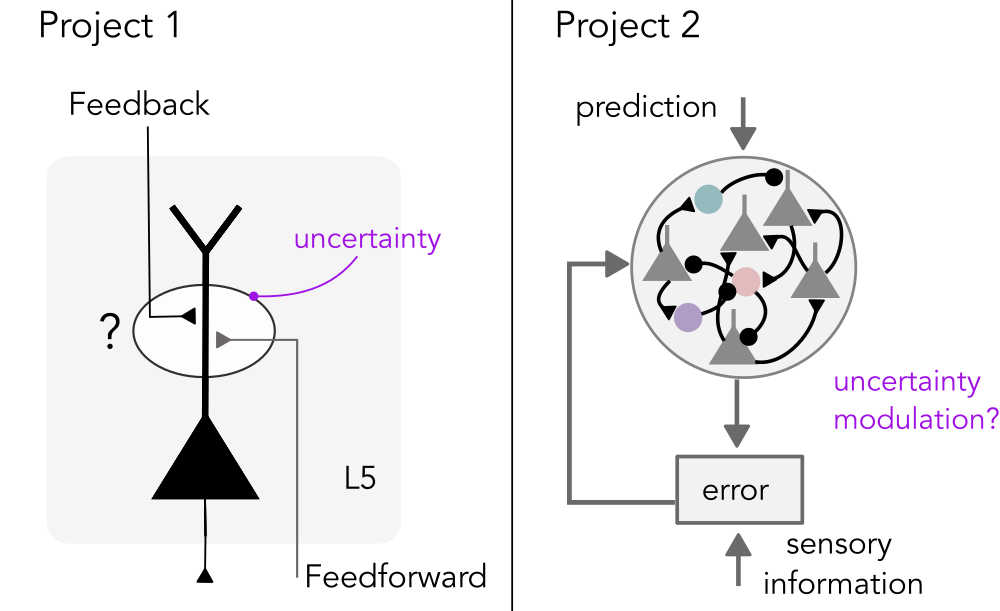Modelling predictive processing in uncertainty

Type: Student projects (NSC) or Master Theses
Keywords: predictive processing, interneuron circuits, spiking neural networks, recurrent neural networks
Research Context
Our research group studies the neural mechanisms underlying perception and learning in uncertain environments.
Our brain maintains an internal model of the world, based on which it can make predictions about sensory information (Kveraga et al. 2007, Cohen et al. 2011). These predictions are useful for perception and learning in the uncertain and changing environments in which we evolved. First, when sensory information is noisy or limited, predictions from the internal model can be integrated with sensory information to improve perception. Second, when predictions and sensory information do not match, the resulting prediction errors can be used for learning and improving the internal model. In each case, the brain faces the challenge of integrating the two processing streams arising from sensory inputs and predictions. Normative theories suggest that the optimal weighting of predictions and sensory information depends on their reliability (or uncertainty). Indeed, behavioural studies show that humans can estimate uncertainty and adjust their behaviour accordingly (PayzanPayzan-LeNestour & Bossaerts, 2011; Walker et al. 2019). While neural correlates for prediction errors could be identified in diverse cortical areas in different species (Keller et al. 2012, Zmarz and Keller 2016, Fiser et al. 2016, Attinger et al. 2017, Gillon et al. 2021, Eliades and Wang 2008, Keller and Hahnloser 2009, Ayaz et al. 2019), the link between high-level normative theories and cellular-level observations of prediction errors and representations under uncertainty is still missing.
Available Projects
Project 1: Deep layer pyramidal neurons in switching between top-down and bottom-up processing based on uncertainty
This project focuses on investigating the role of deep layer pyramidal cells in switching between feedforward and feedback processing based on uncertainty. These pyramidal neurons detect coincidences between top-down and bottom-up inputs by changing their firing mode from regular spiking to bursting when apical (top-down) and proximal (bottom-up) inputs coincide within a limited time window (also termed BAC-firing Larkum et al., 1999)
Your task will be to (1) develop a spiking version of an existing circuit model of predictive processing in which the deep layer neurons are equipped with dendrites, including the BAC-firing mechanism, and (2, optional) the deep layer circuit includes different inhibitory cell types. You will study the circuit dynamics, and activity of error and representation neurons on different levels.
Learning Outcome
Through this project, you will:
• enhance your knowledge of cortical circuits, in particular develop a better understanding of circuit dynamics
• develop your modelling skills, in particular modelling spiking neural circuits
• collaborate with experts in neuroscience and computational neuroscience
Project 2: Recurrent neural networks (RNNs) for predictive processing
The goal of this project is to investigate the role of recurrent neural networks in predictive processing. Your task will be (1) to implement RNNs that learn a prediction task and that are biologically plausible in that they respect Dale’s law (which states that neurons are either excitatory or inhibitory but not both), and (2) to investigate how uncertainty affects learning in these networks.
Learning outcome
Through this project, you will:
• enhance your knowledge of cortical circuits and recurrent neural network dynamics
• develop your modelling skills, in particular recurrent neural network modelling
• get familiar with pytorch
• collaborate with experts in neuroscience and computational neuroscience
Your Profile
You bring:
- Academic background in computational neuroscience, math, physics or engineering
- Programming skills (python)
- Motivation and interest in understanding how the brain works
To apply please send a CV and transcript of records to:
Prof. Dr. Katharina Wilmes: katha@ini.uzh.ch